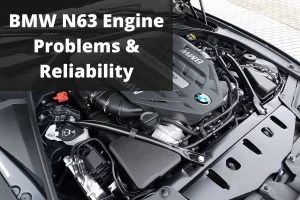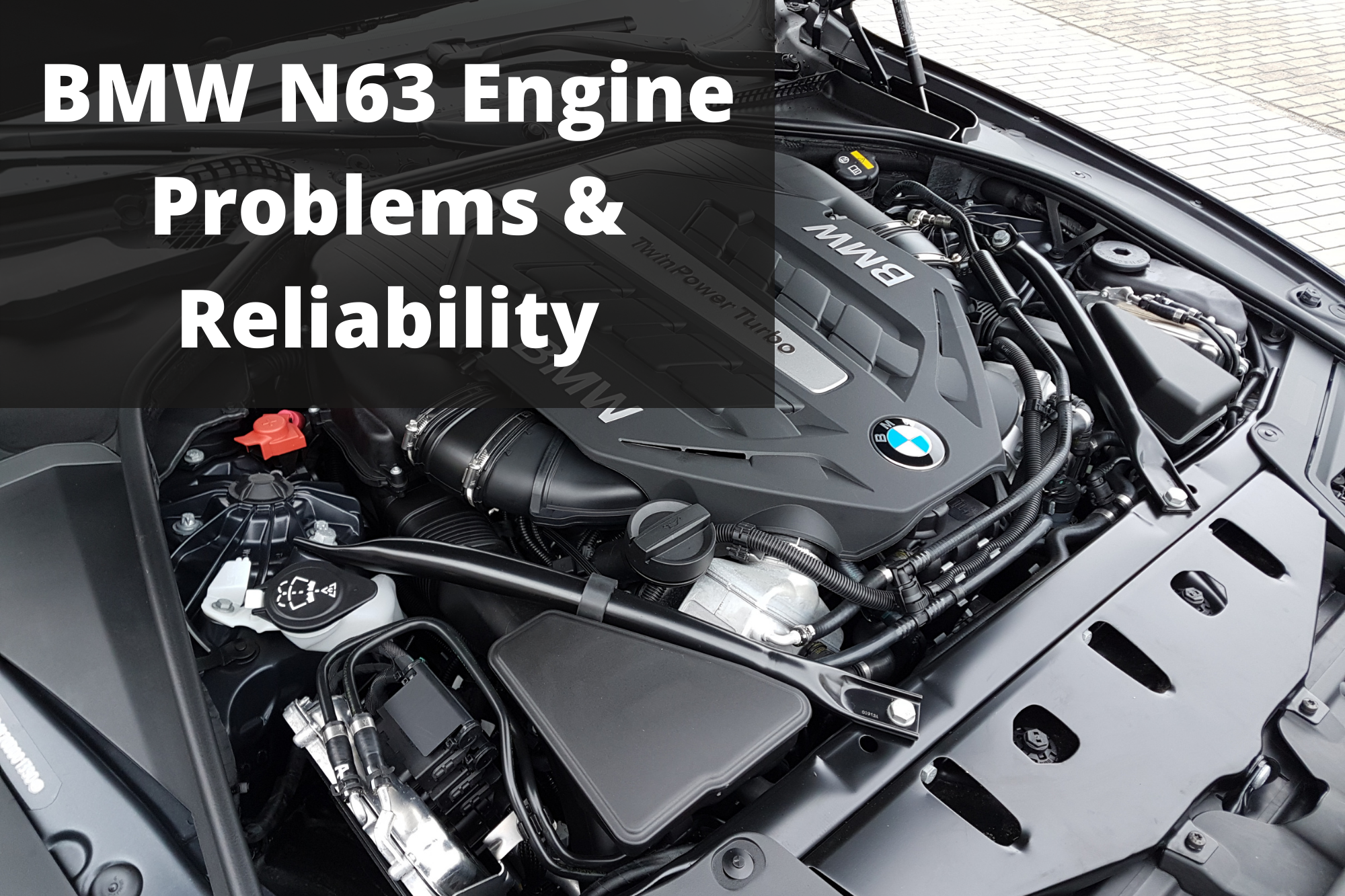We all know that BMWs are expensive cars. But what we don’t know is that they can be even more expensive to maintain. If you own a BMW with an N63 engine, you may have already experienced some of the common issues with this engine. In this blog, we will discuss some of the most common BMW N63 engine problems and what you can do to avoid them.
Contents
BMW N63 Engine Problems: Causes and Consequences
The BMW N63 is a twin-turbo V8 petrol engine that has been in production since 2008. It is available in both 4.4-liter and 4.8-liter variants and is used in a variety of BMW models, including the 7-Series, X5 and X6.
While the N63 engine is generally reliable, it has been known to suffer from a few issues. The most common problem is oil leaks, which can occur from either the cylinder head gasket or the turbocharger gaskets. If left unchecked, these leaks can cause serious engine damage.
Other issues that have been reported include premature wear of the engine’s timing chain tensioners and guides, as well as problems with the fuel injectors. In rare cases, the engine’s connecting rods have also been known to break.
If you own a BMW with an N63 engine, it’s important to be aware of these potential problems and to have the car regularly serviced by a qualified mechanic. This will help to ensure that any issues are caught early and repaired before they cause serious damage.
The BMW N63 Engine: Design and Common Problems
The BMW N63 is a twin-turbocharged V8 engine that was produced by BMW from 2008 to 2016. It is the world’s first production car engine to use a “hot-vee” layout, with the turbochargers located in the valley between the cylinder banks. The N63 was developed alongside the more powerful S63 V8 engine, and both engines were produced at BMW’s plant in Munich.
The N63 engine was used in a variety of BMW vehicles, including the 7 Series, X6, and 5 Series. It was also used in several Rolls-Royce vehicles, including the Ghost and Wraith.
The N63 engine has been plagued by several problems since its inception, most notably excessive oil consumption and turbocharger failure. These problems have led to numerous lawsuits and class-action lawsuits against BMW. In 2016, BMW issued a recall for more than 140,000 vehicles equipped with the N63 engine.

The BMW N63TU Engine: An Overview
The BMW N63TU is a Twin-Turbocharged 4.4-liter V8 engine that was produced by BMW from 2008 to 2016. The N63TU was the first ever turbocharged V8 engine produced by BMW and was initially introduced in the E71 X6 xDrive50i and E72 X6 M50i models. The N63TU engine was replaced by the BMW N63B44O0 engine in 2016.
The N63TU engine is notable for its use of two twin-scroll turbochargers, direct injection, and Valvetronic variable valve lift technology. The engine also features an aluminum block and cylinder heads with double-VANOS variable valve timing.
The N63TU engine was used in a variety of BMW vehicles, including the F01 740i, F02 740Li, F03 750i, F04 750Li, F06 750i xDrive, F07 760Li, F10 550i, F12 650i, F13 650i xDrive, and the G30 540i.
The BMW N63TU engine has been plagued with a variety of issues since its introduction, including premature failure of the turbochargers, oil leaks, and cylinder head gasket failures. These problems have resulted in several class-action lawsuits being filed against BMW.
Oil Leaks: The Most Common N63 Engine Problem in BMW
The BMW N63 is a twin-turbo V8 petrol engine that has been in production since 2008. It is used in a variety of BMW models, including the 7-Series, X5 and X6.
The engine has proved to be problematic for many owners, with oil leaks being a common issue. This can lead to serious engine damage if the leaks are not fixed, so it is important to be aware of the problem and get it fixed as soon as possible.
There are a few different ways to fix oil leaks on the BMW N63 engine, but the most common and effective method is to replace the seals and gaskets. This will usually cost between $1000 and $1500, depending on the severity of the leak.
The issue with Timing Chains: A Precursor of Engine Failure
The BMW N63 is a twin-turbocharged V8 gasoline engine that was produced by BMW from 2008 to 2016. This engine, along with the related S63, was launched in the E71 X6 xDrive50i and X5 xDrive50i sports activity vehicles.
The N63 is the world’s first production car engine to use a “hot-vee” layout, with the turbochargers located inside the “V” of the engine. It is also BMW’s first turbocharged V8 engine.
The N63 replaced the naturally aspirated 4.4-liter V8 used in previous X5 and X6 models.
The N63 engines have been notorious for issues with their timing chains. These problems can result in catastrophic engine failure, and BMW has issued multiple technical service bulletins (TSB) attempting to address the issue. In some cases, BMW has extended the warranty on these engines to 8 years or unlimited mileage in an attempt to rectify the problem.
BMW N63 Engine Problems: Valve Stem Seals
BMW N63 engines have been known to have issues with their valve stem seals. This can cause several problems, including:
- Oil leaks
- Engine misfires
- Decreased engine performance
- Check engine light coming on
If you are experiencing any of these issues, it is important to have your BMW N63 engine checked by a qualified mechanic as soon as possible.
The issue with the Water Pump of the BMW N63 Engine
The BMW N63 engine is known for having water pump issues. The water pumps on these engines are known to fail prematurely, and as a result, the engine can overheat. This can lead to several problems, including engine damage.
If you have an N63 engine, it is important to keep an eye on the water pump and replace it if necessary. Failure to do so can lead to serious problems down the road.
Conclusion
The BMW N63 is a twin-turbocharged V8 petrol engine that has been in production since 2008. It is BMW’s first V8 engine to use a “hot-vee” layout, with the turbochargers located inside the “V” of the engine. It is also BMW’s first turbocharged V8 engine. The N63 is the world’s first production car engine to use Twin Scroll turbocharging.
The N63 replaced the naturally aspirated, non-turbocharged V10 engines that were previously used in the BMW M5 and BMW M6. It was first used in the 2008 E71 X6M and E72 X5M, and later in the 2010 F01 750i, F02 750Li, F04 760Li, and F10 M5.
The N63 was originally available in 4.4L (4395 cc) and 4.8L (4806 cc) variants. The 4.8L variant was discontinued in 2015, leaving only the 4.4L variant available. The N63 has been used in a variety of vehicles from BMW, Rolls-Royce, and Tesla Motors.
The BMW N63 has been plagued with a variety of issues since its inception, with many owners reporting problems with premature engine failure, excessive oil consumption, and spark plug fouling. In addition, many owners have also reported issues with turbocharger failure, fuel injector failure, and cylinder misfiring. As a result of these issues, the N63 has earned a reputation as being one of BMW’s most troublesome engines.
FAQs
Q. Can the N63 Be Reliable?
A. The N63 originally produced from 2009 to 2013 is termed BMW’s least reliable engine of all time.
Q. Which Cars Had the N63 Engine?
A. This Engine is found in BMW 550i, X6, X5, 650i, and 750i models.
Related Articles: https://balancedvehicle.com/blog

